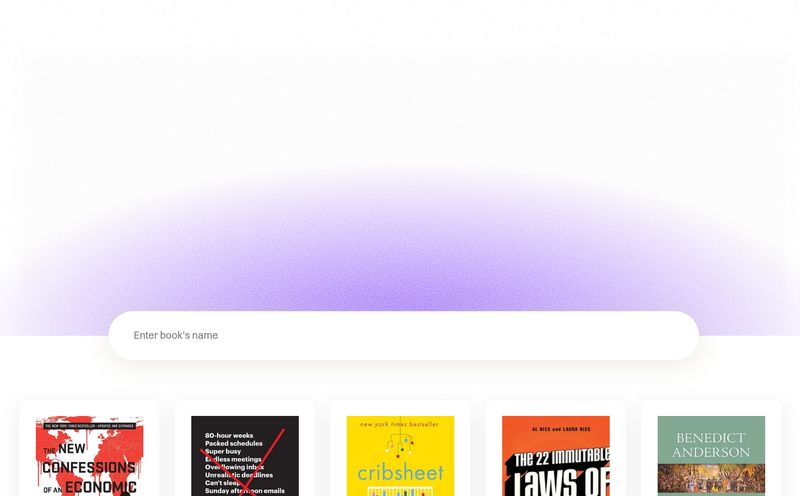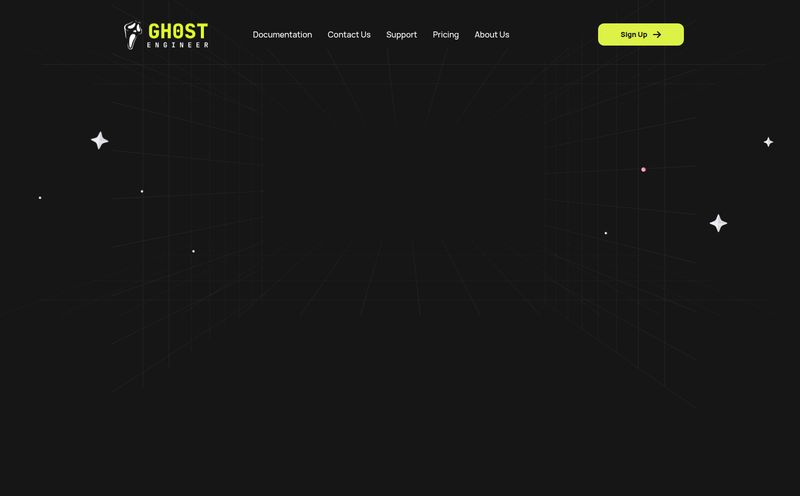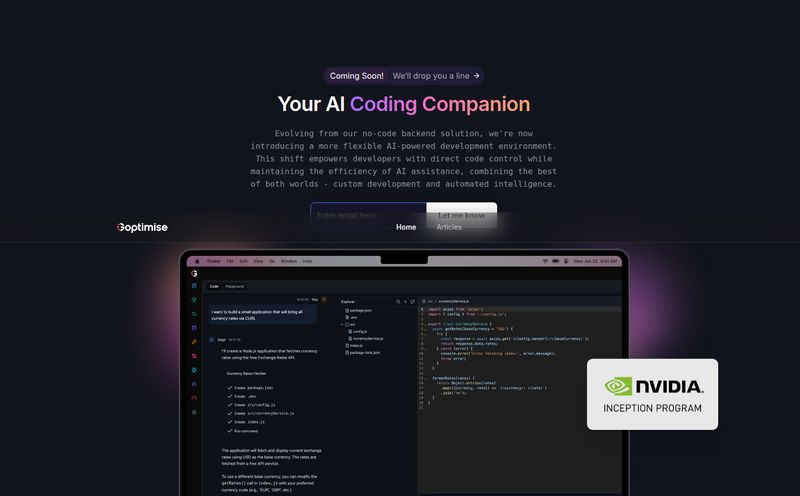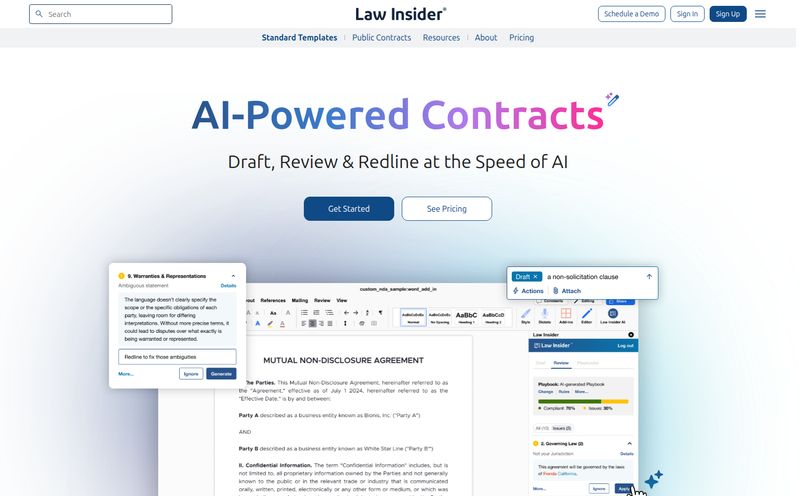If you're in SEO, marketing, or any field that requires you to constantly be learning, your browser probably looks like a chaotic crime scene. Dozens of tabs, a mess of bookmarks, and that one PDF you downloaded three weeks ago that holds the key to… something. You know the feeling. It’s a constant battle to not just find information, but to connect it to the knowledge you already have.
I've been on a perpetual hunt for a tool that can act as a second brain. Not just another search engine, but something that understands my context. Something that can sift through my digital hoarding and the entire internet at the same time. So, when I stumbled upon MemFree, a self-proclaimed "hybrid AI search engine," my curiosity was definitely piqued. Another AI tool promising to change my life? Color me skeptical but hopeful.
I’ve spent the last couple of weeks putting it through its paces, and I've got some thoughts. Is it just another shiny object in the ever-expanding universe of AI, or is it the research co-pilot I've been waiting for?
So, What is MemFree Anyway?
At its heart, MemFree is an AI-powered search tool, but with a twist. The “hybrid” part is its secret sauce. Instead of just scraping Google and giving you a summarized answer, it combines a search of the public internet with a search of your own personal knowledge base. Think of it like a brilliant research assistant who has read every bookmark you’ve ever saved, every webpage you’ve indexed, and every document you’ve uploaded... and also happens to have instant access to the web.
It’s designed to stop you from re-Googling the same concept you researched last month. The goal is to build a personalized information hub that gets smarter the more you use it. A novel idea, and one that resonates with anyone who feels like they're constantly reinventing the wheel with their research process.
The Features That Actually Matter
A tool is only as good as what it can do. MemFree comes packed with a few features, but a couple of them really stand out from the crowd.
The Hybrid Search Engine: Your Personal Google
This is the main event. You start by feeding MemFree your own content. This can be bookmarks, links to specific web pages, or even uploaded files like PDFs and images. When you ask a question, it doesn't just go out to the internet. First, it looks through your stuff. Did you save an article about Google's latest algorithm update? It will pull information from there and synthesize it with fresh results from the web. I found this incredibly useful for researching topics I’ve touched on before. It’s like saying, “Hey, find me the latest on Core Web Vitals, but also remind me what I learned from that one Search Engine Land article I saved.” It's a subtle shift, but a powerful one.
The AI Page Generator: From Idea to UI in Seconds
Now this was a surprise. I wasn't expecting a UI generator in a search tool, but here we are. And honestly? It's pretty darn cool. You can give it a simple text prompt like, "Create a landing page for a new coffee subscription box with a modern, minimalist feel," and it spits out a functional, visually appealing UI mockup. It’s not going to replace a professional web designer, lets be clear about that. But for quickly visualizing an idea, creating a wireframe for a client, or just playing around with layout concepts, it’s fantastic. This feature alone adds a whole different dimension to the tool, moving it from just a research assistant to a creative partner.

Visit MemFree
Beyond Search: Your All-in-One Research Assistant
MemFree also bundles in some of the more standard AI assistant features, but they’re well-integrated. You can drop in a link to a long article or a dense PDF and ask it to summarize the key points or answer specific questions about the content. Huge time saver. For my developer friends, it has a code interpreter that can explain code snippets or even write new ones based on your requests. I also had some fun with the Twitter search function, which lets you ask questions about trends and conversations happening on X. It’s a bit niche, but for social media managers or trend spotters, it could be quite handy.
My Hands-On Experience with MemFree
Signing up was straightforward. I immediately started bookmarking some of my go-to SEO resources and a few recent project briefs. My first test was simple: "Summarize the key ranking factors discussed in the documents I've uploaded and compare them to current public consensus on SEO best practices."
The result was… impressive. It didn’t just list things. It created a coherent response that referenced my specific documents and then layered on broader context from the web. It was that moment of connection—seeing my own knowledge reflected back at me and enhanced—that was the real “aha!” moment. It felt less like a search and more like a conversation.
Of course, it’s not perfect. On the free plan, the search limit of 5 per day feels a bit tight. You burn through them quickly just getting a feel for the platform. And sometimes the AI can get a little… verbose. But the quality of the core hybrid search is undeniable.
Let's Talk Money: MemFree Pricing Breakdown
Ah, the all-important question: what's this going to cost me? MemFree operates on a freemium model, which I always appreciate. Here's a quick rundown of what you get at each level.
The Free Plan is basically a trial. You get 5 AI searches and 5 UI page generations per day, and you can only index up to 10 bookmarks or pages. It’s enough to see if you like the core concept, but not enough for any serious work. It's limited to the GPT-4o-mini model.
The Pro Plan is where things get serious. For a monthly fee, you get a massive boost: up to 500 AI searches and 500 page generations per month, the ability to index 1,000 bookmarks, and a much larger token output for longer answers. Critically, this tier unlocks access to better AI models like GPT-4o and Claude-3.5-Sonnet, which makes a noticeable difference in the quality of the responses. This feels like the sweet spot for most professionals and power users.
The Premium Plan is for the heavy hitters. We're talking 3,000 searches and page generations per month, 10,000 indexed items, and access to the top-tier O1-preview AI model. This is for agencies, enterprise teams, or individual researchers who are living inside this tool day in and day out.
| Feature | Free | Pro | Premium |
|---|---|---|---|
| AI Searches/Month | ~150 (5/day) | 500 | 3000 |
| AI Page Gens/Month | ~150 (5/day) | 500 | 3000 |
| Indexed Items | 10 | 1000 | 10000 |
| Supported AI Models | GPT-4o-mini | GPT-4o, Claude-3.5-Sonnet, etc. | Includes O1-preview |
Who Is MemFree Really For?
So, who should drop what they're doing and try MemFree? In my opinion, it's a fantastic tool for a few key groups. SEO professionals and content marketers will love the ability to build a knowledge base of top-performing articles and internal research. Developers and programmers will find the code interpreter and the quick UI generation surprisingly practical. Students and academic researchers could build an incredible personal library of papers and sources, making thesis writing a whole lot less painful.
Who might not need it? If you're a casual internet user who just needs to find a recipe or check the weather, standard Google is obviously fine. MemFree is for people whose work is information.
The Good, The Bad, and The AI
So let's boil it down. The best thing about MemFree is its core concept: the hybrid search. It genuinely feels like a step forward from generic AI chatbots. The multi-model support on the paid plans is also a huge plus, giving you the flexibility to choose the best AI for the job. On the flip side, the free plan is quite restrictive, so you really have to commit to a paid plan to get the full experience. Some might also find the sheer number of features a little overwhelming at first. It tries to be a search engine, a page builder, and a document analyzer all at once, which is ambitious.
Conclusion: Is MemFree My New Co-Pilot?
After a few weeks, I’m still using MemFree. It hasn't completely replaced my chaotic tab-hoarding habit, but it's made a significant dent in it. It has successfully become my starting point for any new research project. The ability to ground AI responses in my own curated content is, for me, the killer feature.
It’s not a magic bullet, but it’s a smart, well-designed tool that understands a fundamental problem many of us knowledge workers face every single day. If you feel like you're drowning in information and wish you had a smarter way to navigate it, I'd say give the free trial a spin. You might just find the second brain you’ve been looking for.
Frequently Asked Questions
What is a hybrid AI search engine?
A hybrid AI search engine, like MemFree, combines searching the public internet with searching a user's private, curated knowledge base (like bookmarks, notes, and uploaded files). This allows it to provide answers that are both current and personally contextualized.
Can I use MemFree for free?
Yes, MemFree offers a free plan. However, it is quite limited, with a cap of 5 searches and 5 page generations per day, and a small limit on how many items you can add to your knowledge base. It's best used as a trial to see if you like the platform.
What AI models does MemFree support?
MemFree supports a variety of modern AI models depending on your subscription tier. This includes OpenAI's GPT-4o-mini and GPT-4o, Anthropic's Claude-3.5-Sonnet, and the O1 series of models on higher tiers. This flexibility allows you to choose the best model for your specific query.
Is MemFree good for coders?
Yes, it can be very useful for developers. MemFree includes a feature to explain existing code snippets and write new code based on natural language prompts. Combined with its research capabilities, it's a solid tool for technical problem-solving.
How is MemFree different from Perplexity AI?
While both are AI-powered search and answer engines, the main difference is MemFree's "hybrid" approach. Perplexity AI is excellent at searching the web and providing cited answers. MemFree does that too, but its primary differentiator is its ability to integrate and prioritize your personal knowledge base in its search process, making the results more tailored to you.
Can MemFree really generate web pages?
Yes, the AI Page Generator can create functional UI and page mockups from a text description. While it won't produce a final, production-ready website, it's an excellent tool for rapid prototyping, creating wireframes, and visualizing web design ideas quickly.



